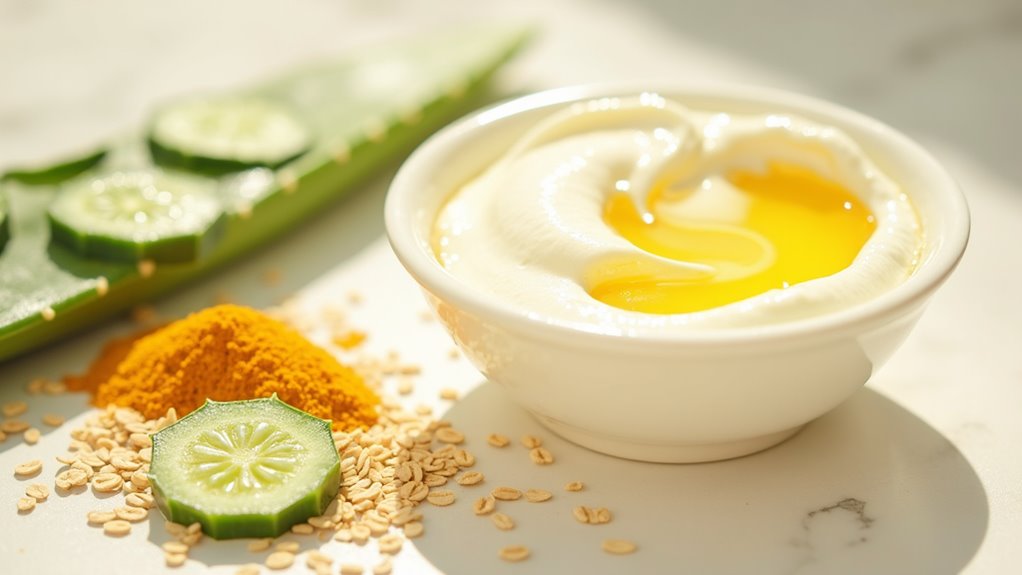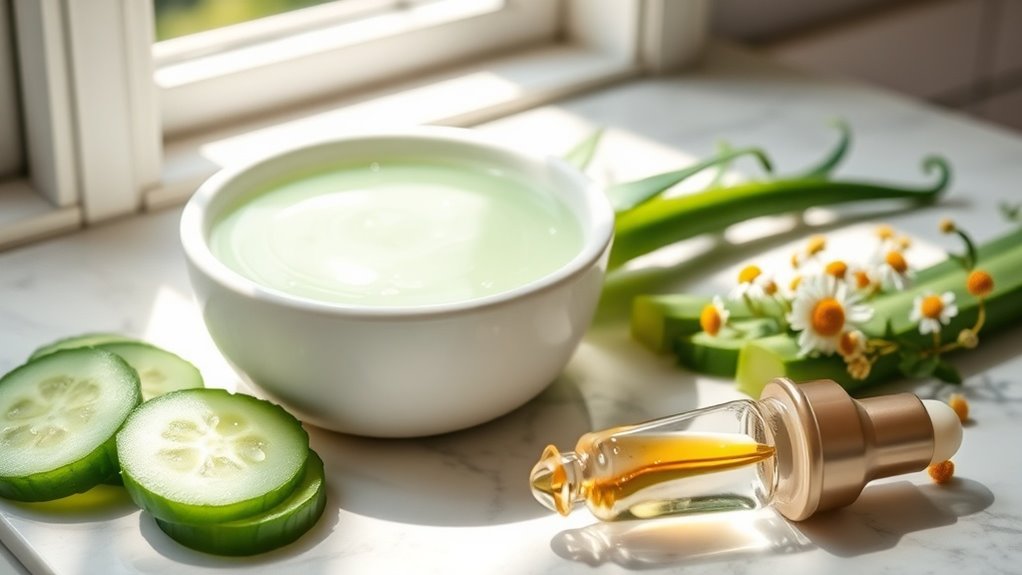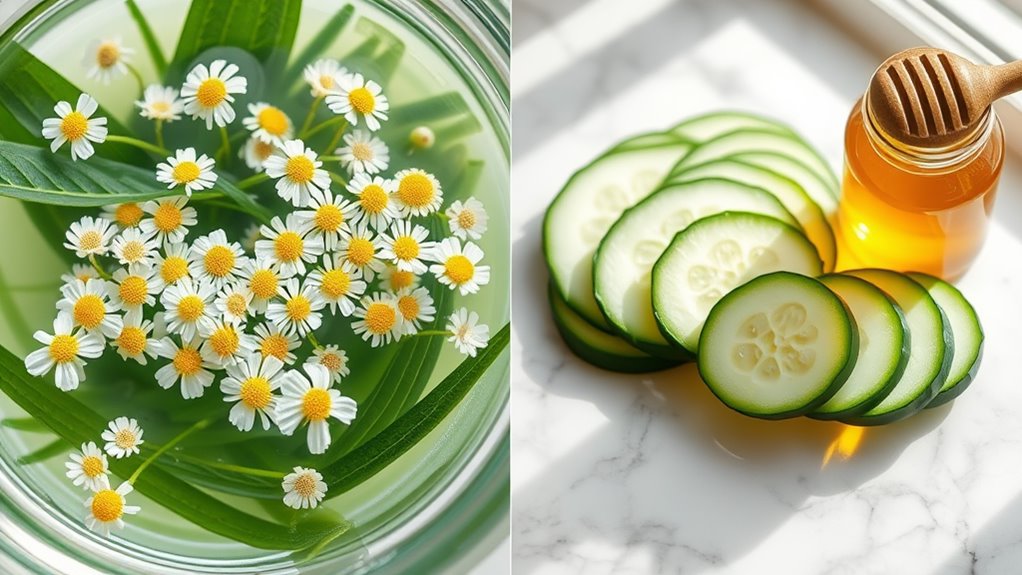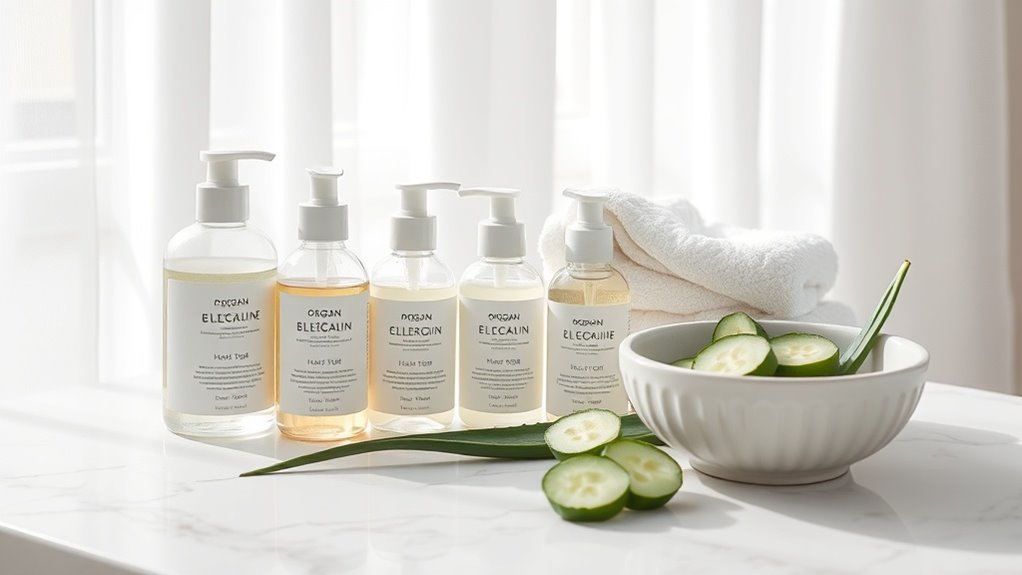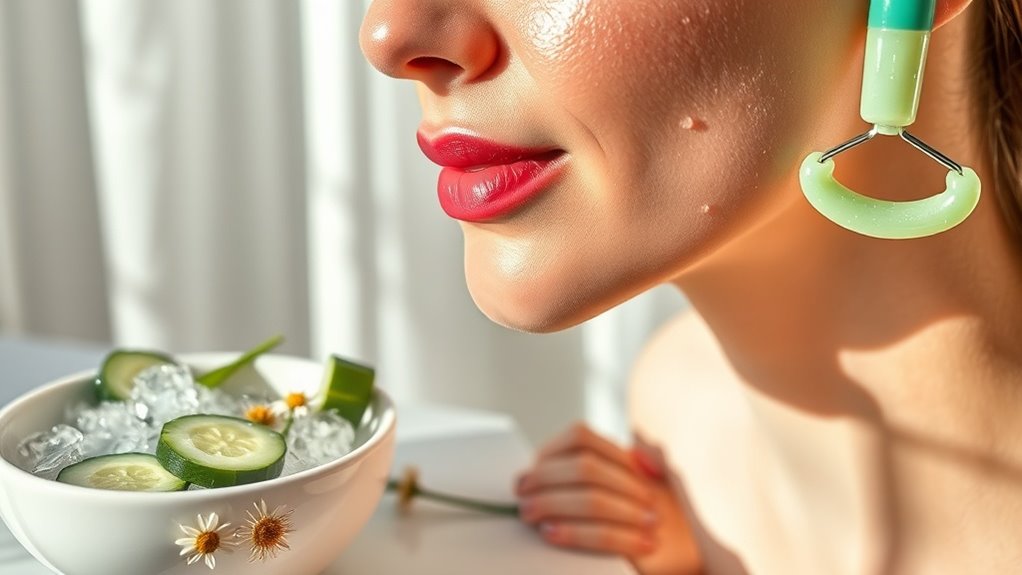Best Natural Tips I Used for My Sensitive Skin
You’ll find relief from sensitive skin by focusing on gentle, natural ingredients like chamomile, aloe vera, and colloidal oatmeal. Start with a mild, fragrance-free cleanser, followed by alcohol-free toner and non-comedogenic moisturizer with SPF 30. Enhance your routine with omega-3 rich foods and weekly DIY treatments like honey-oatmeal masks. Avoid common irritants such as synthetic fragrances, sulfates, and hot water. Discover how simple lifestyle modifications can transform your sensitive skin care journey.
Understanding My Sensitive Skin Journey
Through years of trial and error, understanding sensitive skin requires recognizing its unique characteristics and triggers.
You’ll notice your skin reacts intensely to environmental factors, certain products, and stress. Common signs include redness, itching, burning, and inflammation when exposed to irritants.
One of the most valuable sensitive skin tips is learning to identify your specific triggers through careful observation and documentation.
You’ll need to monitor how your skin responds to different ingredients, weather conditions, and lifestyle factors. This awareness becomes the foundation for developing an effective, personalized skincare routine that minimizes reactions and maintains skin health.
Essential Natural Ingredients That Worked
After identifying your skin’s triggers, incorporating natural ingredients with proven anti-inflammatory properties can significantly reduce sensitivity reactions.
Focus on chamomile, known for its bisabolol content that calms irritation. Aloe vera’s polysaccharides provide deep hydration while reducing redness. Green tea’s polyphenols offer antioxidant protection against environmental stressors.
Colloidal oatmeal creates a protective barrier and contains avenanthramides that soothe inflammation. Calendula’s triterpenes accelerate skin healing, while honey’s natural antibacterial properties help prevent reactions.
These ingredients work best when used consistently in their pure, minimally processed forms.
Like apple cider vinegar, a natural astringent can also help calm sensitive skin reactions when applied gently.
My Morning Skincare Routine
Because sensitive skin requires extra care in the morning, following a gentle yet effective routine is crucial.
Start by washing your hands thoroughly to prevent bacteria transfer. Use a mild, fragrance-free cleanser with lukewarm water, avoiding hot water which can trigger irritation. Pat your face dry with a clean microfiber towel.
Apply an alcohol-free toner containing chamomile or aloe vera. Wait 60 seconds, then layer a hypoallergenic serum with ceramides. Follow with a non-comedogenic moisturizer containing SPF 30 or higher.
Don’t forget your neck area. Allow each product to absorb fully before applying the next.
Like natural pain relief mechanisms, your skin has built-in healing responses that proper morning care can support.
Evening Care for Sensitive Skin
While your morning routine protects sensitive skin throughout the day, your evening regimen focuses on gentle cleansing and repair. Remove makeup and impurities with a fragrance-free micellar water, followed by a sulfate-free cleanser. Apply treatments rich in ceramides and niacinamide to strengthen your skin barrier. Since your skin has a natural pH of 5.5, it’s important to avoid harsh alkaline products that can damage the moisture barrier.
| Step | Product Type |
|---|---|
| Cleanse | Micellar Water |
| Double Cleanse | Gentle Cleanser |
| Treat | Barrier Repair Serum |
Allow each product to absorb fully before applying the next. Finish with a hypoallergenic moisturizer and avoid active ingredients like retinol until your skin’s tolerance improves. Keep your nighttime routine consistent and monitor your skin’s response.
DIY Face Masks and Treatments
When it comes to natural face masks for sensitive skin, you’ll find gentle relief with a mixture of finely ground oatmeal and raw honey, which provides both anti-inflammatory and moisturizing benefits.
You can enhance this mask’s soothing properties by adding a teaspoon of pure aloe vera gel, known for its skin-calming compounds and healing abilities. These ingredients work together to reduce redness and irritation while supporting your skin’s natural barrier function.
For added nourishment and antimicrobial protection, try incorporating virgin coconut oil to help combat potential skin infections while deeply moisturizing.
DIY Honey Oatmeal Mask
A gentle honey oatmeal mask offers one of the most effective natural treatments for sensitive skin. This combination leverages honey’s antimicrobial properties with oatmeal’s anti-inflammatory benefits to soothe irritated skin.
- Grind 1/4 cup of organic oats into a fine powder.
- Mix with 2 tablespoons of raw honey until well combined.
- Apply evenly to clean, damp skin using circular motions.
- Let sit for 15-20 minutes to allow active ingredients to penetrate.
- Rinse thoroughly with lukewarm water and pat dry.
This mask helps reduce redness, moisturizes, and creates a protective barrier without triggering reactions common to sensitive skin types.
Calming Aloe Vera Treatments
Since ancient times, pure aloe vera gel has demonstrated remarkable soothing properties for sensitive, irritated skin due to its high concentration of antioxidants and anti-inflammatory compounds.
You’ll need to extract fresh gel from an aloe leaf or use a pure, organic aloe vera gel. Apply a thin layer directly to clean skin, focusing on inflamed areas.
For enhanced benefits, mix 2 tablespoons of aloe gel with 1 teaspoon of cucumber juice and ½ teaspoon of vitamin E oil. Leave this mixture on for 15-20 minutes, then rinse with cool water. Use this treatment 2-3 times weekly to reduce redness and inflammation while maintaining skin hydration.
Foods That Helped My Skin
You’ll find that incorporating leafy greens and antioxidant-rich foods like spinach, kale, and berries can help combat skin inflammation and promote cellular repair.
Adding healthy fats from sources such as avocados, nuts, and olive oil will support your skin’s natural barrier function and maintain hydration.
Water-rich foods like cucumbers, watermelon, and citrus fruits can boost your skin’s moisture levels while providing essential vitamins and minerals for a healthier complexion.
Adding apple cider vinegar to your morning routine can help balance your skin’s pH levels and fight acne-causing bacteria naturally.
Leafy Greens and Antioxidants
While exploring treatments for sensitive skin, incorporating specific nutrients through diet proved transformative for my complexion.
Through extensive research and personal experience, you’ll find these antioxidant-rich leafy greens particularly beneficial for calming sensitive skin:
-
Kale contains vitamins A, C, and K, which reduce inflammation and support collagen production.
-
Spinach delivers high levels of zinc and vitamin E to strengthen skin barrier function.
-
Swiss chard provides essential minerals that combat free radical damage.
-
Collard greens offer omega-3 fatty acids to maintain skin hydration.
-
Watercress contains sulforaphane, which helps neutralize environmental toxins and reduce redness.
Healthy Fats for Skin
Beyond the power of leafy greens, healthy fats play a direct role in maintaining skin barrier function and reducing sensitivity.
You’ll find essential omega-3 fatty acids in wild-caught salmon, sardines, and mackerel, which help decrease inflammation and maintain skin hydration.
Plant-based sources like avocados, walnuts, and chia seeds provide alpha-linolenic acid (ALA), supporting collagen production and skin elasticity.
Cold-pressed olive oil contains vitamin E and polyphenols that protect against oxidative stress.
Include these fats daily, aiming for 2-3 servings of fatty fish weekly and a tablespoon of seeds or nuts with each meal.
Water-Rich Foods Matter
Maintaining optimal skin health requires more than just topical treatments, as hydration from water-rich foods plays a crucial role in skin barrier function.
Your body’s largest organ needs consistent internal hydration to maintain elasticity and promote cellular turnover.
- Cucumber (96% water) contains silica and vitamin C that strengthen connective tissue
- Watermelon (92% water) delivers lycopene and beta-carotene for UV protection
- Celery (95% water) provides electrolytes and anti-inflammatory compounds
- Bell peppers (92% water) offer vitamin C for collagen synthesis
- Strawberries (91% water) contain ellagic acid that prevents collagen breakdown
Lifestyle Changes for Better Skin Health
Since sensitive skin requires a comprehensive approach to care, implementing key lifestyle modifications can significantly improve your skin’s health and resilience.
You’ll need to minimize sun exposure and always wear broad-spectrum SPF 30+ sunscreen. Maintain consistent sleep patterns, aiming for 7-9 hours nightly, as sleep deprivation can trigger inflammation.
Manage stress through meditation or yoga, as cortisol spikes can worsen skin sensitivity. Don’t smoke, limit alcohol intake, and exercise moderately to boost circulation.
Keep your bedding clean, change pillowcases weekly, and use fragrance-free laundry detergents to reduce potential irritants.
Consider switching to a silk pillowcase to prevent sleep lines and reduce friction on sensitive skin while you rest.
Common Irritants to Avoid
While caring for sensitive skin requires diligence, identifying and avoiding common irritants remains crucial for preventing flare-ups and reactions.
You’ll need to be vigilant about checking product labels and understanding potential triggers that can affect your skin’s health.
- Harsh synthetic fragrances in skincare, detergents, and personal care products
- Sulfates (SLS/SLES) commonly found in cleansers and shampoos
- Chemical sunscreens containing oxybenzone or avobenzone
- Hot water during cleansing or showering
- Alcohol-based products and astringents that can disrupt skin barrier
Monitor your skin’s response to these irritants and eliminate them from your daily routine to maintain healthier, calmer skin.
Weekly Care and Special Treatments
Beyond daily skincare essentials, sensitive skin benefits from specialized weekly treatments that support barrier repair and reduce inflammation.
Apply a gentle enzyme mask once weekly to remove dead cells without harsh scrubbing. Use a fragrance-free sheet mask enriched with ceramides and hyaluronic acid to boost hydration.
Consider weekly facial massages with cold jade rollers to decrease puffiness and calm irritation.
Similar to apple cider vinegar treatments, always conduct a patch test 24 hours before trying new skincare products on sensitive skin.
You’ll want to patch test new treatments 24 hours before full application.
Schedule intensive treatments at least three days apart to prevent overwhelming your skin’s natural barrier. Document your skin’s response to optimize your treatment schedule.
Seasonal Adjustments for Skin Protection
Just as your weekly treatments adapt to your skin’s needs, your skincare routine must shift with changing seasons. Your sensitive skin requires specific seasonal adjustments to maintain its protective barrier and prevent adverse reactions.
-
Increase humectants like hyaluronic acid in winter to combat indoor heating’s drying effects.
-
Switch to lighter, oil-free moisturizers during humid summer months.
-
Apply broad-spectrum mineral sunscreen daily, doubling protection time during peak UV hours.
-
Use calming ingredients such as chamomile and aloe during spring allergy seasons.
-
Incorporate barrier-repair ceramides in autumn to prepare for cold weather stress.

